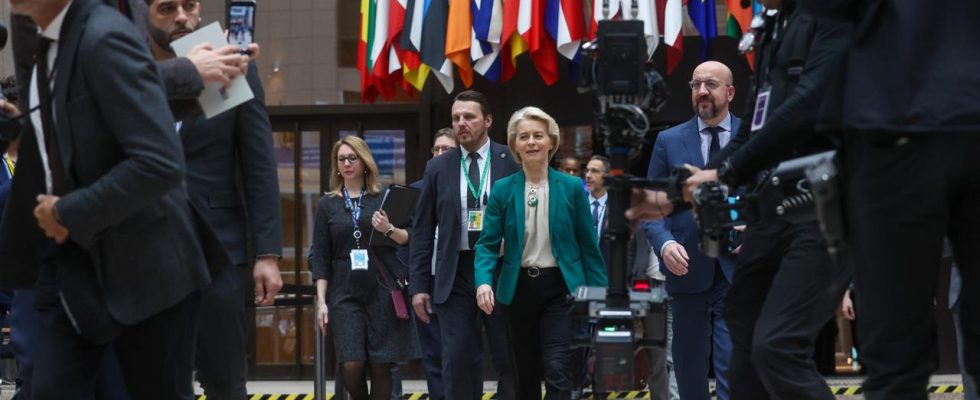At the EU summit today, the latest developments in the world’s crisis regions will be discussed again. The main focus in Brussels should be on economic policy and Europe’s competitiveness.
For three decades, the European internal market has guaranteed growing prosperity in the EU member states. It is considered one of the greatest achievements of the European Union.
In order for it to stay that way, a lot of things have to change: The corona pandemic has shown how vulnerable supply chains are. The Russian war of aggression in Ukraine made the EU aware of its dependence on foreign energy supplies. System rival and competitor China distorts competition with massive subsidies. From an EU perspective, even our partner USA is putting European companies at a disadvantage in the race for green technologies with its funding program.
In short: The EU sees itself being pressured or even left behind by partners and competitors when it comes to growth, productivity and innovation.
Make the internal market crisis-proof
That is why the Community wants to make the internal market crisis-proof and future-proof – through a new agreement on competitiveness. To do this, the member states should remove obstacles and better implement existing regulations. This should help to provide services more easily across EU borders and allow capital to work.
In recent years, however, member states have not always been willing to reduce legal and bureaucratic hurdles for service providers and employees from partner countries. Former Italian Prime Minister Enrico Letta worked for months on a report on this, which he is now presenting to the heads of state and government.
Enrico Letta had 300 meetings in 50 cities for six months to gauge the mood in Europe. His report will form the basis of the EU reform debate today.
Progress in the Capital Markets Union?
Sustainable restructuring of Europe’s economy costs hundreds of billions of euros per year. In addition, EU governments want to massively arm themselves in view of the threat from Russia. But the member states cannot make the necessary investments alone.
In order to raise additional private funds, they want to harmonize the capital market, i.e. align national regulations. This applies to stock exchange and insolvency law as well as corporate and dividend taxation. Experts have been working on this for years without any tangible progress. That’s exactly what the EU summit called for at the end of March, and that’s what the 27 are debating this time too.
Chancellor Olaf Scholz calls the Capital Markets Union the “crucial resource for future growth”. He proposes reforms to insolvency law and corporate taxation. Scholz complains that money from Europe flows into American capital collection centers before it is reinvested from there in European start-ups.
Several member states are also calling for a European market for securitizations to release capital. Banks combine loans into a package in which investors invest. Since the financial crisis of 2008, securitization has had a bad reputation. However, the banking association emphasizes that they are among the particularly transparent and regulated financial market instruments.
The capitals agree that a harmonized capital market needs to be better controlled. However, many reject France’s demand to locate this supervision in Paris and to expand the ESMA stock exchange supervisory authority based there.
Debate about Iranian attack
Since last weekend, the summit has had a new theme: the Iranian attack on Israel has raised concerns that the war in the Middle East could escalate into a conflagration. Washington and Berlin strongly condemned Tehran’s attack and at the same time called on Israel to show restraint. This tenor is likely to also characterize the final declaration of the summit.
Commission President Ursula von der Leyen said after a G7 video conference on Sunday that the EU would discuss additional sanctions with a view to Iran’s drone and missile programs. Several member states have proposed expanding existing EU punitive measures targeting Iranian drone production for Russia.
Help for Ukraine
Moscow is using such drones in its war of aggression against Ukraine. The situation there is also worrying from a Western perspective and will be discussed at the summit. Ukrainian President Volodymyr Zelensky expects the Russian army to launch an offensive at the end of May or beginning of June.
He is urgently asking the EU and USA for more military help – especially in the form of “Patriot” anti-aircraft systems, additional artillery and ammunition. These could be paid in part from interest income from Russian assets frozen in the EU. According to an EU diplomat, the first proceeds could flow as early as June.
Belgium’s Prime Minister Alexander de Croo also wants to address the suspicion at the summit that Moscow has bribed MEPs. As the seat of the EU institutions, Belgium has a responsibility to protect the right of every citizen to vote freely and safely, explained De Croo, with a view to the European elections in June.
Jakob Mayr, ARD Brussels, tagesschau, April 16, 2024 6:39 p.m

